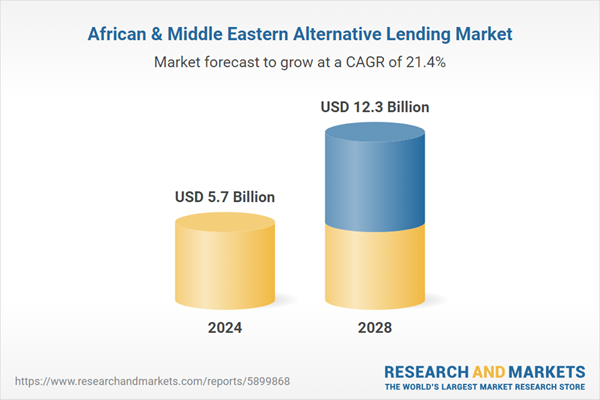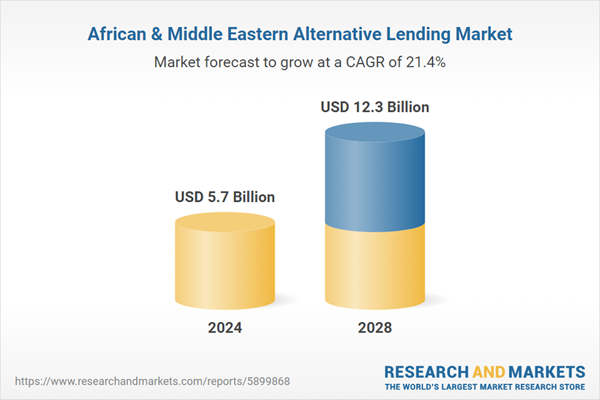Bussiness
Africa & Middle East Alternative Lending Business Report 2024: Market to Grow by 31.3% to Reach $5.7 Billion this Year – Investment Opportunities to 2028


African & Middle Eastern Alternative Lending Market


Dublin, Sept. 26, 2024 (GLOBE NEWSWIRE) — The “Africa & Middle East Alternative Lending Market Business and Investment Opportunities Databook – 75+ KPIs on Alternative Lending Market Size, By End User, By Finance Model, By Payment Instrument, By Loan Type and Demographics – Q2 2024 Update” report has been added to ResearchAndMarkets.com’s offering.
The alternative lending in the region is expected to grow by 31.3% on an annual basis to reach US$5.7 billion in 2024. Alternative lending adoption is expected to grow steadily over the forecast period, recording a CAGR of 21.4% during 2024-2028. The alternative lending market in the region will increase from US$4.3 billion in 2023 to reach US$12.3 billion by 2028.
Medium to long term growth story of alternative lending in Middle East & Africa remains strong. This report provides a detailed data-centric analysis of the alternative lending market covers in-depth market potential and various. Embark on a detailed exploration of the alternative lending market with our latest report, dissecting key economic indicators to provide a holistic view of this dynamic landscape. Delve into the alternative lending market’s expansive horizons, from overall market size and forecasts to granular analyses of end-user segments, diverse finance models, and payment instrument intricacies.


The alternative lending sector is rapidly expanding, driven by rising demand for flexible financing, innovative fintech solutions, and supportive regulatory frameworks. Key developments include new product launches, strategic partnerships, and regulatory advancements, positioning alternative lending as a pivotal element of the region’s financial landscape.
Growth in the Alternative Lending Sector
Alternative lending has experienced significant growth, driven by increasing demand for flexible financing options and the rapid expansion of fintech solutions. Key sub-segments such as buy now, pay later (BNPL) and digital lending platforms are gaining traction, particularly in markets like Saudi Arabia and the UAE, where a tech-savvy population and favorable regulatory environments foster innovation.
Alternative lending is expected to continue growing in the next few months, with firms likely to form strategic partnerships to launch new products and enhance service delivery. The ongoing economic pressures and the need for accessible credit solutions will further propel the sector’s growth, positioning it as a vital component of the region’s financial landscape.
In Africa, alternative lending has surged due to growing demand for flexible financing among SMEs and mid-market businesses. Digital platforms and fintech innovations have enabled faster, more accessible lending tailored to diverse borrower needs.
The alternative lending sector is expected to expand further in the next few months, particularly in areas such as peer-to-peer lending and microfinance. As economic conditions evolve and the need for inclusive financial services becomes more pronounced, alternative lending will likely play a crucial role in supporting economic recovery and development across the continent.
Key Attributes:
|
Report Attribute |
Details |
|
No. of Pages |
1312 |
|
Forecast Period |
2024 – 2028 |
|
Estimated Market Value (USD) in 2024 |
$5.7 Billion |
|
Forecasted Market Value (USD) by 2028 |
$12.3 Billion |
|
Compound Annual Growth Rate |
21.4% |
|
Regions Covered |
Africa, Middle East |
Product Launches and Innovations
-
Halo’s Mortgage Service in the UAE – Halo, a digital mortgage service provider in the UAE, recently completed a seven-figure seed funding round in February 2023. This funding will allow Halo to expand its mortgage offerings to meet increasing demand due to rising real estate prices in the region.
-
Kiva’s Expansion in Africa – Kiva, a global crowdfunding platform, has expanded its operations in Africa by launching new initiatives aimed at enhancing access to microloans for entrepreneurs. This expansion funds underserved communities, leveraging technology to streamline the lending process and promote financial inclusion.
-
M-Pesa’s Enhanced Lending Features – M-Pesa, the renowned mobile money service, has rolled out enhanced lending features that allow users to access credit directly through their mobile wallets. This initiative aims to simplify the borrowing process and make it more accessible for individuals and small businesses in Kenya and beyond.
-
Lulalend’s New Credit Solutions – South Africa-based digital lender Lulalend announced the launch of new credit solutions after raising $35 million in a Series B funding round. The firm has integrated its lending services with partners like Vodacom and e-commerce giant Takealot, aiming to better serve SMEs in various sectors, including construction and retail.
Strategic Partnerships
-
African Guarantee Fund and European Partners – The African Guarantee Fund (AGF) has partnered with the African, Caribbean and Pacific Group of States, the European Union, and the UN Development Programme to provide credit guarantees for around 5,000 SMEs in five countries, facilitate affordable financing for “development minerals” businesses, and improve access to capital for underserved sectors.
-
The International Finance Corporation (IFC) and Ecobank Collaboration – The IFC and Ecobank are partnering to support SMEs in fragile and conflict-affected states in West and Central Africa. They have established a $110 million risk-sharing facility to enable Ecobank to provide credit to SMEs, bolstering economic resilience in these regions.
-
EIB Partnerships with Local Financial Institutions – The European Investment Bank (EIB) has been collaborating with local financial institutions to improve SME access to finance across Africa, focusing on financial sustainability and positive developmental impacts.
-
HES FinTech and AZM – HES FinTech partnered with AZM, a leading entity in digital lending, to enhance digital lending capabilities for SMEs as it expands into Saudi Arabia and the UAE.
-
MasterCard and Egabi – In May 2023, MasterCard partnered with Egabi, an Egypt-based company, to expand digital lending services in the Middle East. This aims to enhance Egabi’s digital lending capabilities, allowing more businesses to enter the market and enabling consumers to benefit from buy now, pay later (BNPL) services.
-
Emkan Finance and IBM Collaboration – Emkan Finance partnered with IBM to launch a new digital lending solution aimed at small businesses in Saudi Arabia. This collaboration enhances Emkan’s ability to provide financial support through a decision-making engine, streamlining the lending process for SMEs.
Regulatory Changes
-
South Africa’s Conduct of Financial Institutions Bill (COFI) – South Africa will promulgate the Conduct of Financial Institutions Bill (COFI) in 2024. COFI will provide a unified regulatory framework for financial institutions, ensuring fair treatment and protection for customers, while setting clear guidelines for alternative lending providers.
-
Crypto Asset Regulations in South Africa – South Africa now regulates crypto assets, recognizing them as financial products. Crypto asset service providers (CASPs) are considered accountable institutions under the Financial Intelligence Centre Act, requiring them to conduct customer due diligence, maintain client information and transaction records, and comply with reporting obligations to address money laundering and terrorist financing concerns.
-
African Development Bank’s Initiatives – The African Development Bank (AfDB) has actively promoted alternative financing solutions globally. In 2022, AfDB launched the African Guarantee Fund, providing credit guarantees to enable financial institutions to offer more affordable financing to SMEs. Additionally, the bank partnered with local financial institutions to enhance financing access for SMEs in fragile and conflict-affected states in West and Central Africa.
-
Saudi Arabia’s Fintech Strategy – Saudi Arabia leads fintech regulation in the Middle East. In 2022, the Saudi Central Bank (SAMA) launched the Fintech Strategy to establish the Kingdom as a global hub for fintech innovation, including initiatives to support startups, attract investment, and develop a strong regulatory framework.
-
UAE’s Virtual Asset Regulation – In 2022, the UAE introduced the Virtual Asset Regulation Law to oversee and license virtual asset service providers, ensuring consumer protection and market integrity.
-
Bahrain’s Open Banking Regulation – In 2020, the Central Bank of Bahrain introduced the Open Banking Framework, requiring banks to provide third-party providers access to customer data upon customer consent. This has facilitated the development of alternative lending platforms using open banking APIs to streamline the lending process and offer personalized solutions.
For more information about this report visit https://www.researchandmarkets.com/r/ciid7y
About ResearchAndMarkets.com
ResearchAndMarkets.com is the world’s leading source for international market research reports and market data. We provide you with the latest data on international and regional markets, key industries, the top companies, new products and the latest trends.
Attachment
CONTACT: CONTACT: ResearchAndMarkets.com Laura Wood,Senior Press Manager press@researchandmarkets.com For E.S.T Office Hours Call 1-917-300-0470 For U.S./ CAN Toll Free Call 1-800-526-8630 For GMT Office Hours Call +353-1-416-8900










